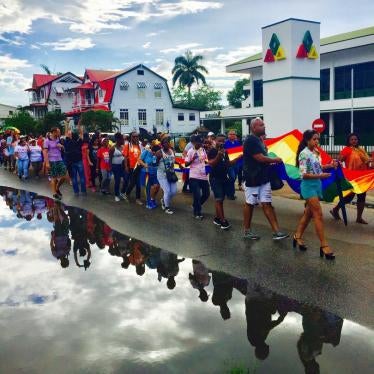Suriname’s government is on the right track at home when it comes to protecting Lesbian, Gay, Bisexual and Transgender people (LGBT) against discrimination and violence. The government introduced anti-discrimination legislation including sexual orientation in grounds for non-discrimination complaints. The government also understands that it needs to protect the rights of same-sex couples living in Suriname. The Suriname justice minister, Dr. Jennifer van Dijk-Silos, recently organized several public hearings in collaboration with civil society in Suriname to discuss the expansion of the rights of LGBT people.
So far, good news.
But abroad, Suriname is playing a completely different tune. Let’s analyse two recent votes at the United Nations in New York.
On November 21, a United Nations General Assembly committee affirmed that the newly appointed UN expert to address violence and discrimination based on sexual orientation and gender identity could continue his work. The proposal was submitted by Brazil, Colombia, Mexico, Argentina, Uruguay, Chile and Costa Rica, countries close to Suriname in many ways.
The UN Human Rights Council had created the position of independent expert on sexual orientation and gender identity in June to assess implementation of existing international human rights law, identify best practices and gaps, raise awareness of violence and discrimination based on sexual orientation and gender identity, and engage in dialogue and consultation with countries and other stakeholders. The position also facilitates provision of advisory services, technical assistance, capacity-building, and cooperation to help address violence and discrimination on these grounds.
The appointment of this international expert is in line with Suriname’s policy to protect LGBT people against violence and discrimination. In fact, shortly before the vote 850 non-governmental organisations from 156 countries around the world, including Suriname, called on the United Nations to take a principled stand that LGBT rights are human rights and need to be protected.
But what did Suriname do on November 21? It voted against!
Was this a mistake and did the deputy-ambassador press the wrong button during the voting procedure? Unfortunately not.
A few days earlier, on November 18, there was another vote at the United Nations. The general Assembly voted on a resolution urging all countries to protect everyone’s right to life and calling upon countries to investigate hate killings. The resolution included killings based on the victim’s sexual orientation or gender identity.
A no brainer for Suriname. However, Suriname voted to delete the part of the resolution about sexual orientation and gender identity!
It joined the ranks of countries like Saudi Arabia, Yemen, Egypt and Sudan. Suriname is member of the Organization of Islamic Cooperation (OIC). But that should not be a reason to sell out on its principles of equal rights and non-discrimination. Albania and Turkey for instance are also OIC member countries and vote consistently against OIC proposals. They join the countries that respect human rights for all.
But it is not too late.
Later this month Suriname might get a second chance when a new proposal to postpone the mandate of the independent expert on sexual orientation and gender identity is expected to be submitted and voted upon.
This time the government of Suriname can show the rest of the world it takes protection of human rights for everyone seriously.
The world is watching.







